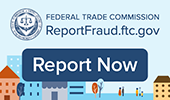Your power over identity theft
The FBI has stated that identity theft is the fastest growing white-collar crime in the nation. Identity thieves only need to gather your name, address, date of birth, social security number, and bank or credit card numbers to take over your identity and wreak havoc.
Did you know that you have the power to monitor your own credit for free? You can do this by visiting the Annual Credit Report website or calling 1-877-322-8228. Because your credit report can be utilized to evaluate your creditworthiness when applying for a loan, insurance, renting a home, or even employment, it is imperative to check your credit reports for accuracy and indicaitons of identity theft.
In addition to visiting the Annual Credit Report website, you could visit or contact the three major credit reporting agencies seperately.
![]()
800-685-1111
Report fraud: 800-525-6285/ TDD: 800-255-0056

888-EXPERIAN (397-3742)
Report fraud: 888-EXPERIAN (397-3742) / TDD: Use relay to fraud number above

800-916-8800
Report fraud: 800-680-7289/ TDD: 877-553-7803
Think you can outsmart the scammer? Take the quiz at BanksNeverAskThat.com
Are you building your credit from scratch? Has your credit taken a hit?
Improving your credit score may feel like facing a mountain, but just know that with time and consistency, you can conquer that mountain one step at a time.
These general steps can help practically anyone build their credit score:

![]()

- Request your free credit reports – Your credit reports matter, which is why Community State Bank recommends you periodically check your credit report. Federal law allows you to get a copy of your credit report annually from each credit reporting company at no cost. Your credit rating could affect mortgage rates or apartment requests, getting approved for a credit card, and even help or hurt you in a job search. Reviewing your credit reports can also help you identify signs of identity theft and help you protect your credit rating. If you see inaccurate or incomplete information, you have the right to dispute it with the company that reported it or the credit bureau.
- Establish Your Credit File – Opening new accounts that will be reported to Experian, Equifax, and/or TransUnion is an essential first step to building your credit file. This will be the foundation on which your credit scores will rest. Consider applying for a loan with Community State Bank with a monthly payment. When paid as agreed, it will positively reflect on your credit file. You may also look for credit cards with low-interest rates and no annual fee, such as our Consumer Credit Card. If you have a trusted family member or friend who uses their card responsibly, you could ask to be added to their account as an authorized user. Experian also offers Experian Boost which gives you credit for bills like your phone, utilities, and popular streaming services.
- Consistent on-time payments – Because payment history makes up 35% of your credit score, having a long history of on-time payments will benefit you. Payments that are at least 30 days delinquent can be reported to the credit bureaus and will damage your score. Setting up automatic payments through our free online bill pay can help you avoid missing a payment. Consider creating a filing system to keep track of monthly bills and set alarms on your phone to remind you of upcoming bills. Late payments can stay on a credit report for up to seven years. If you have past-due accounts, you may consider consolidating debts into a low-interest credit card or personal loan. This could reduce the amount of bills owed monthly, lower debt, and stop further late charges. If you have questions about obtaining a loan with Community State Bank, please call 800-648-7161.
- Keep revolving balances low – Credit usage makes up 30% of your credit score. If you have a high balance on revolving credit accounts, that can lower your credit score. The simplest way to maintain a low credit utilization percentage is to pay your credit card balances in full each month. You could also contact your credit card company and ask for a credit limit increase. If you don’t increase your balance along with your new limit, raising your credit limit will lower your utilization percentage. Aim for 30% credit utilization or less. Once you have a credit card paid off, do not close it. Do you remember what we learned about payment history? If you close a card, all your consistent monthly payments will fall off your history. The same is not true for delinquent accounts.
- Re-think in-store credit applications – I know it sounds tempting when you are checking out, and the cashier offers a large discount for applying for a store credit card, but this one-time discount can cost you in the long run. Each credit card application creates a hard inquiry on your credit report that can last up to two years. Hard inquiries happen when you apply for a mortgage, a vehicle loan, a credit card, or another form of new credit. New credit inquiries make up 10% of your credit score.
There are many factors that come into play when establishing or rebuilding your credit. Time and consistency are your best friends here. Be wary of debt repair or settlement companies who promise to fix your credit for a price. These companies cannot do anything you can’t do yourself for free. Knowledge is power. Information on filing disputes or reporting inaccuracies is available free within each credit bureau’s website.
Are you ready to take the first step? The time will pass anyway.
“The light at the end of the tunnel isn’t the illusion, the tunnel is.” - unknown

Learn more about Fraud Prevention and how to protect yourself online at these trusted sites:
- USA.gov/Scams and Fraud
- BanksNeverAskThat.com
- FBI Internet Crime Complaint Center
- FBI.gov/scams-and-safety

